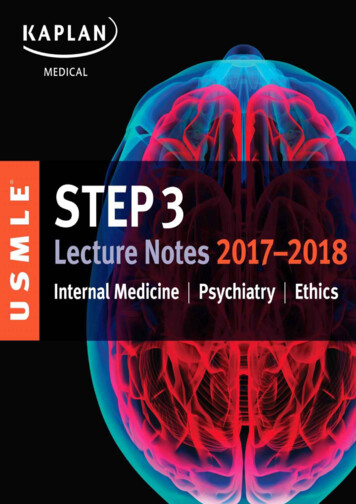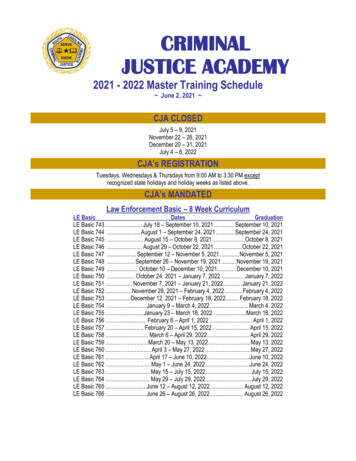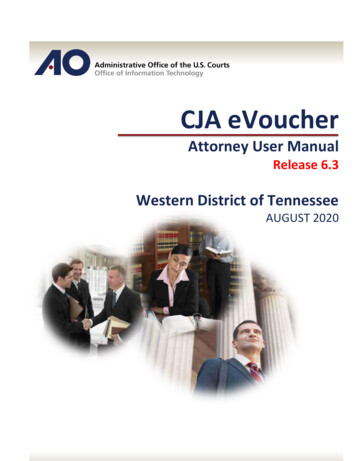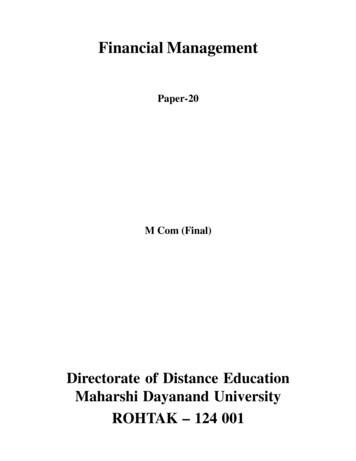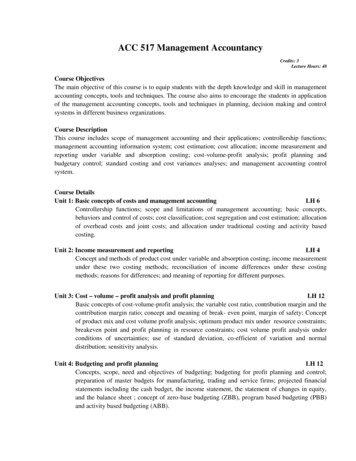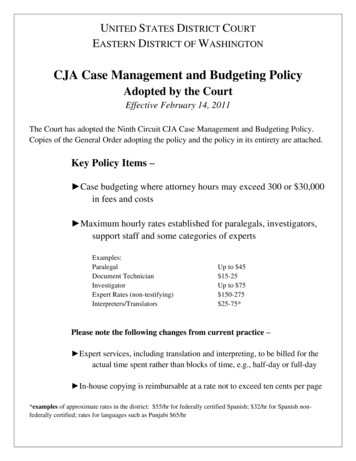
Transcription
UNITED STATES DISTRICT COURTEASTERN DISTRICT OF WASHINGTONCJA Case Management and Budgeting PolicyAdopted by the CourtEffective February 14, 2011The Court has adopted the Ninth Circuit CJA Case Management and Budgeting Policy.Copies of the General Order adopting the policy and the policy in its entirety are attached.Key Policy Items – Case budgeting where attorney hours may exceed 300 or 30,000in fees and costs Maximum hourly rates established for paralegals, investigators,support staff and some categories of expertsExamples:ParalegalDocument TechnicianInvestigatorExpert Rates (non-testifying)Interpreters/TranslatorsUp to 45 15-25Up to 75 150-275 25-75*Please note the following changes from current practice – Expert services, including translation and interpreting, to be billed for theactual time spent rather than blocks of time, e.g., half-day or full-day In-house copying is reimbursable at a rate not to exceed ten cents per page*examples of approximate rates in the district: 55/hr for federally certified Spanish; 32/hr for Spanish nonfederally certified; rates for languages such as Punjabi 65/hr
UNITED STATES DISTRICT COURTEASTERN DISTRICT OF WASHINGTON123In the matter of)))5 CRIMINAL JUSTICE ACTNON-CAPITAL REPRESENTATIONS)6))7)General Order No.4ADOPTION OFCRIMINAL JUSTICE ACTCASE MANAGEMENT ANDBUDGETING POLICY89IT IS HEREBY ORDERED that effective February 14, 2011, the attached10Criminal Justice Act Case Management and Budgeting Policy for Non-Capital11Representations is adopted in the United States District Court for the Eastern District12of Washington. Cases to be budgeted include cases in which the attorney hours may13exceed 300, or 30,000 in fees and costs.1415The “Reimbursement Rates” set forth in Appendix 1 of this Policy shall applyin all CJA cases regardless of whether the case is budgeted.161718ADOPTED by the Court on January 10, 2011. The Case Management andBudgeting Policy becomes effective February 14, 2011.1920212223FOR THE COURTLONNY R. SUKOCHIEF UNITED STATES DISTRICT JUDGE2425262728GENERAL ORDER RE ADOPTION OF CJA CASE MANAGEMENT AND BUDGETING POLICY– NON-CAPITAL REPRESENTATIONS
Criminal Justice ActCase Management and Budgeting Policy1NON-CAPITAL REPRESENTATIONSThe Ninth Circuit Judicial Council has approved the following casemanagement and budgeting policies applicable to non-capital representations forcounsel appointed under the Criminal Justice Act, 18 U.S.C. § 3006A. Thesepolicies apply to all CJA criminal and post-conviction appointments that do notinvolve capital criminal or capital habeas representations. The policies also applyto those appointments that initially involved capital criminal representations thatwere later dismissed or not certified. The policies implement the statutoryauthorization for fair compensation of legal services reasonably necessary for suchindigent legal representation.The policies should be read in conjunction with the Guidelines for theAdministration of the Criminal Justice Act and Related Statutes, Volume 7, Guideto Judiciary Policies and Procedures (“CJA Guidelines”) which apply to all CJArepresentations. To the extent these policies conflict with the CJA Guidelines, thepolicies prevail.Nothing in these policies is intended to restrict the authority of the court toapprove variations as needed in a particular case.1.Case Budgeting. According to the U.S. Judicial Conference’sresolution and under the CJA Guidelines § 230.26.10, courts are encouraged tobudget any representation of a defendant anticipated to exceed 300 attorney hoursor 30,000 in fees and costs paid by CJA funds for appointed counsel and servicesother than counsel. Courts are further encouraged to enlist the assistance of theNinth Circuit’s case budgeting attorney (see Appendix 3). The development of acase budget in larger non-capital representations helps ensure that defense counselreceive the resources necessary to effectively represent the accused. A case budgetand supporting documentation provides the reviewing court with sufficient1Adopted by the Judicial Council of the Ninth Circuit, October 20, 2010CJA Billing Guidelines, page 16
information to assess the reasonableness, monitor fairness and more effectivelyoversee the expenditure of CJA funds.Once it is determined that the cost of representation for a defendant willlikely exceed 300 hours or the 30,000 threshold, the court may request thedevelopment of a complete or staged budget for the defendant’s representation. Itmay be difficult for counsel to anticipate case costs, particularly in the early stages.The court may grant counsel a finite amount of “seed money” to allow the defenseto become familiar with the case, develop strategy, gather a team, and develop andfile budgets for attorneys and service providers during the first days afterarraignment. The seed money is part of the overall budget and not money inaddition to the budget; therefore, the seed money should be included in the Stage 1budget. As the case progresses, budgeting should become more precise. The courtmay order variations in a case budget to meet the needs of a particular case.Courts should require that budgets be submitted using the circuit’s Excelbudgeting system. The circuit is developing an internet-based budgeting and casebilling system to replace the current Excel system and this internet-based systemshould be used when it becomes available. Using these systems will provideuniformity of submissions which will benefit the judges and court staff along withexpediting CJA attorney and service providers’ payments (see Appendix 3).Counsel, investigators, experts or service providers may not exceed thebudget authorized by the court. Expending additional hours or incurring additionalcosts without prior court approval may result in the denial of payment. If it isanticipated that the compensation will exceed the budgeted amount by either 5,000 or 10 percent, whichever is less, advance approval should be obtained fromthe court.2.Establish and Adhere to Approved Rates. The current maximumhourly rates for Criminal Justice Act attorneys are established by Congress,adopted by the Judicial Conference of the United States and may be found at 18U.S.C. § 3006A(d)(1) as amended and incorporated in the CJA Guidelines at§230.16(a). The current maximum hourly rates for paralegals, investigators,support staff and some categories of experts are listed in Appendix 1 of thispolicy. Rates for members of the defense team may not exceed the maximum ratesestablished by this policy unless authorized in advance by the court and the ChiefJudge of the Ninth Circuit or the Chief Judge’s delegate (hereinafter, Chief Judge).CJA Billing Guidelines, page 27
In the interest of justice, the court and the Chief Judge may find that thetimely procurement of necessary services could not await prior authorization ofrates that exceed the maximum rates established in this policy. In thesecircumstances, nunc pro tunc approval may be granted.The statutory CJA attorney hourly rate is intended to include compensationfor general overhead costs. CJA Guidelines § 230.66.20(a). Therefore, except inextraordinary circumstances (CJA Guidelines § 320.70.30) additional fees for workperformed by counsel or other personnel, rent, telephone service and secretarialexpenses associated with CJA representation are not reimbursable. CJAGuidelines § 230.66.10(b).In most cases, only one CJA-compensated attorney is authorized for eachclient representation. CJA Guidelines § 230.53.10(a). Appointed counsel areencouraged to use lower-billing associates, contract lawyers, paralegals or othermeans to minimize costs where lead attorney expertise may not be required, suchas for legal research and file review. However, use of associates, contract lawyersand paralegals generally must be pre-approved. Requests must specify the tasks,projected number of hours, the hourly rate and the total anticipated expenditure.Once funding for investigative, expert or other specialized services has beenapproved, counsel is responsible for communicating with the service provider toensure compliance with specific terms of the court order and to ensure that chargesdo not exceed the amount authorized. Counsel should be required to provide anengagement letter to the service provider specifying the terms and limits of theengagement. The letter shall include a warning that fees and costs may not exceedthe contracted amount absent court approval for the additional amount.Payments to service providers should only be authorized at the appropriaterate for the type of task performed. For example, a paralegal or investigator couldgather and organize records to be provided to the expert rather than paying theexpert to perform that function. The expert may perform the function, but chargethe appropriate lower rate.Any experts testifying at a court proceeding shall be paid for the actualnumber of hours they are in attendance at court, plus their travel time andexpenses. Absent court and circuit approval, experts may not exceed the maximumrates set forth in Appendix 1.CJA Billing Guidelines, page 38
3.Geographic Proximity. To minimize travel, counsel should selectlocal investigators and experts when possible. Courts should try to appoint CJApanel attorneys who are located reasonably near to where the case will be heard toavoid unnecessary travel time.Document Review. It is difficult to accurately project costs and timefor the review of voluminous documents and data prior to the completion of theinvestigation or discovery process. Courts and attorneys should confer with theNational Litigation Support Administrator in the Office of Defender Services (seeAppendix 3). Courts should use discovery status conferences in conjunction withex parte review of the CJA budget to make adjustments as circumstances require.Counsel should present a preliminary budget detailing an efficient and costeffective method to review documents and data, such as electronic evidence reviewplatforms, and the use of paralegals and document technicians. If the courtappoints consultants or attorneys skilled in electronic discovery to assist appointedcounsel in developing the budget and discovery plan, the costs of theseappointments should also be included in the budget.4.Division of Labor. Counsel should not spend unnecessary time onconferences and memos among multiple attorneys, and between counsel and staff,such as investigators and paralegals. Such meetings and communications may benecessary and will be compensable if the frequency and time billed are reasonablegiven the needs of a multi-defendant case.5.Specificity in Supporting Timesheets. Each time entry shall reflectdiscrete individual tasks. Information shall be provided in detail sufficient topermit meaningful review, without violating the canons of ethics or disclosingclient confidences. Counsel shall provide the court sufficient information withenough specificity to permit reviewers to determine the necessity of the workperformed and to demonstrate that the amounts sought in the voucher are faircompensation for the services rendered.6.7.Record Keeping. Appointed counsel must maintain contemporaneoustime and attendance records for all work performed, including work performed byassociates, partners, contract lawyers and support staff, as well as expense records.Such records may be subject to audit and must be retained for at least three yearsafter approval of the final voucher for any appointment. CJA Guidelines § 230.76.CJA Billing Guidelines, page 49
Appendix 1Reimbursement Rates (per hour)Counsel are expected to negotiate reasonable hourly rates with serviceproviders depending upon market rates in each district.2 In no event may the ratesexceed those set forth below without court approval. In the interest of justice, theChief Judge may find that the timely procurement of necessary services could notawait prior authorization of rates that exceed the maximum rates established in thispolicy. In these circumstances, nunc pro tunc approval may be granted.Paralegal3Up to 45Document Technician4 15–25Investigator5Up to 75Mitigation Specialist (non-testifying)6Up to 100Expert Rates (non-testifying)Psychiatrists, Neurologists andmedically licensed experts 150–2752The range of rates for each service provider reflects the market rates amongthe fifteen districts in the Ninth Circuit.3Tasks which will be reimbursed at the paralegal rate include transcriptsummarization, subjective coding of documents, internet and legal research, clientcontact, drafting and analysis, review and collection of medical, criminal history,sentencing mitigation or other records.4Tasks which will be reimbursed at the document technician rate includefiling, indexing and transmittal of documents.5The policy contemplates higher hourly rates for investigators who possessforeign language expertise.6See footnote 3 above. Mitigation specialists performing documenttechnician tasks will be reimbursed at the document technician rate.CJA Billing Guidelines, page 510
Forensic Experts 200Psychologists (with Ph.D.) 200Accountants 150–350Interpreters/Translators7 25–757Counsel should attempt to negotiate rates for translation and interpretingwhich provide for billing for the actual time spent rather than flat rates or billingfor blocks of time. If payment is sought for services billed at any rate other than foractual time spent, counsel must provide an explanation and the billing rate issubject to approval by the court.CJA Billing Guidelines, page 611
Appendix 2Expense Policies The use of couriers, messengers and other premium delivery services isdiscouraged unless there is a genuine necessity for this service or unless thecost of the premium service does not exceed United States Postal Serviceexpress mail rates. Explanations and receipts for all such services arerequired. In-house copying is reimbursable at a rate not to exceed ten cents per page.If using a copy service, counsel are expected to negotiate the lowest ratepossible. Counsel should utilize the special rates made available to the U.S.Courts by contract (see Appendix 3). General office overhead expenses are not reimbursable, including, but notlimited to flat-fee computerized research plans, land and cellular telephonemaintenance fees, books and publications, office supplies and equipment andall costs related to educational seminars. All fees for experts and services should be billed for actual hours spent,rather than standardized charges or fixed unit billing for specific tasks.Hourly rates for service providers are intended to include overhead,administrative, or special project management charges. Exceptions may beapproved by the court where market conditions warrant.CJA Billing Guidelines, page 712
Appendix 3 Ninth Circuit Case Budgeting Attorney – 415-355-8982 Assistance with Excel spreadsheets or the Ninth Circuit’s Internet-basedCJA billing system – Ms. Sandy Andrews, 415-355-8984,sandrews@ce9.uscourts.gov Government copying rates (currently at Kinko’s) contact: Ms. Diane L.Abeyta, dabeyta@gpo.gov National Litigation Support Administrator in the Office of DefenderServices, 415-436-7700CJA Billing Guidelines, page 8
to Judiciary Policies and Procedures ("CJA Guidelines") which apply to all CJA representations. To the extent these policies conflict with the CJA Guidelines, the policies prevail. Nothing in these policies is intended to restrict the authority of the court to approve variations as needed in a particular case. 1. Case Budgeting.
